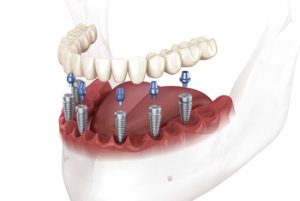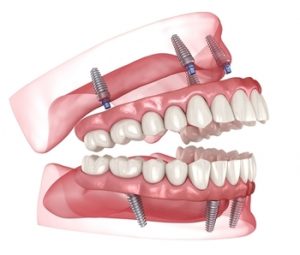Dental implants significantly advance oral health, especially for individuals with missing teeth. Full-mouth dental implants have emerged as a comprehensive solution, offering a semblance of natural teeth both in function and appearance. This essay delves into the intricacies of full-mouth dental implants, a procedure that transforms smiles and restores the fundamental aspects of dental health.
The primary focus here is to dissect the various elements contributing to the cost of full-mouth dental implants. These costs are not just numbers; they encapsulate the entire journey of dental implant treatment, from initial consultation and treatment planning to the final implant placement. Understanding these factors is crucial for anyone considering this life-changing procedure.
Our thesis is rooted in the belief that while the cost of dental implants may seem daunting, the value they bring in restoring oral health and confidence is immeasurable. This essay will guide you through the dental implant costs, including the expenses associated with bone grafting procedures, the choice of implant material like titanium implants, and the dentist’s expertise. By the end, we aim to provide a comprehensive view of full-mouth dental implant costs, ensuring you can make an informed decision about this significant investment in your dental health.
Full Mouth Dental Implants – An In-Depth Guide
Full-mouth dental implants represent a transformative solution for individuals with extensive tooth loss. These implants, a culmination of dental technology, offer a permanent and robust replacement for missing teeth, closely mimicking natural teeth in function and appearance.
Understanding the Process: The journey toward acquiring full-mouth dental implants begins with a detailed consultation and treatment planning with an experienced dentist. This initial phase often includes comprehensive dental imaging to assess the health of the jaw bone, which is critical for the success of the implants. The dental implant procedure involves placing titanium implant posts into the jawbone, anchoring the new teeth. This surgery may be accompanied by bone grafting if the jawbone’s integrity needs reinforcement.
Post-surgery, patients undergo a healing process where the implants integrate with the bone – a phase known as osseointegration. Temporary teeth may be provided during this period. Once healing is complete, permanent, custom-made replacement teeth are attached to the implants, offering a natural and functional smile.
 Cost Considerations: While full-mouth dental implants can be significant, many find the investment worthwhile due to the long-term benefits. Dental health insurance benefits may partially cover the expenses, and many dental practices offer financing options. The total cost varies depending on the need for bone grafting, the number of implants, and the materials used.
Cost Considerations: While full-mouth dental implants can be significant, many find the investment worthwhile due to the long-term benefits. Dental health insurance benefits may partially cover the expenses, and many dental practices offer financing options. The total cost varies depending on the need for bone grafting, the number of implants, and the materials used.
Advantages Over Other Dental Procedures: Full-mouth dental implants stand out as they provide a more permanent and natural solution than tooth replacement options like dental bridges or implant-supported dentures. They promote better oral health by maintaining jaw bone integrity and preventing the shifting of adjacent teeth. Furthermore, unlike removable dentures, they offer greater stability and comfort, allowing for a broader range of food choices and enhancing overall quality of life.
Factors Influencing the Cost
Type of Implants: Traditional vs. Mini Implants
The cost for full-mouth dental implants can vary significantly depending on the type of implants chosen. Traditional dental implants are widely used for their durability and strength, providing a sturdy foundation for replacement teeth. These implants are typically made of titanium, a material known for compatibility with the jaw bone and oral tissues. On the other hand, mini implants are smaller and less invasive, often used when bone grafting is not feasible or when a patient prefers a less complex dental implant procedure. While mini implants might be more affordable, they may only be suitable for some patients and could affect the overall dental implant costs.
Material Used: Titanium vs. Zirconia
The choice of implant material also plays a crucial role in determining the mouth dental implant cost. Titanium implants, known for their strength and longevity, are the most common choice in implant dentistry. They integrate well with the bone, promoting oral health and ensuring the stability of the replacement teeth. Zirconia implants, although relatively newer, offer an aesthetic advantage as they are tooth-coloured and might be more appealing to those concerned with dental appearance. However, zirconia can be more expensive than titanium, impacting dental implant costs.
Geographical Location: Cost Variation by Region/Country
The geographical location significantly affects the cost of full-mouth dental implants. Prices can vary widely from region to country due to differences in living costs, dental practices, and access to dental technology. In some countries, dental health insurance benefits cover a portion of the cost, while patients may have to bear the full expense in others. Patients must research and compare costs in different areas, keeping in mind the expertise of the implant dentist and the quality of dental treatment provided.
Complexity of the Procedure: Individual Patient Needs
The complexity of the dental implant procedure is another critical factor influencing the cost. Individual patient needs, such as the condition of the jaw bone, the need for bone grafting, tooth extraction, or treatment of damaged teeth, often determine this complexity. Patients requiring additional procedures like bone augmentation or treatment planning for multiple tooth implants will face higher costs. Furthermore, choosing between implant-supported dentures, bridges, or single-tooth implants can also affect the overall expense.
In summary, when considering full-mouth dental implants, it is essential to understand the various factors influencing the cost. These include the type of implants (traditional vs. mini), the material used (titanium vs. zirconia), geographical location, and the complexity of the procedure tailored to individual patient needs. Patients should consult with experienced dentists, consider all tooth replacement options, and develop a comprehensive treatment plan to ensure the best oral health and budget outcome.
Additional Costs to Consider
When considering full-mouth dental implants, it’s crucial to account for more than just the initial mouth dental implant cost. Beyond the basic dental implant costs, several additional expenses play a critical role in the overall financial planning of this dental treatment.
Firstly, pre-surgical assessments are indispensable. These evaluations, often involving advanced dental imaging and consultation with an experienced dentist, are crucial in developing a personalised treatment plan. While they add to the dental implant costs, they ensure the suitability and success of the implant procedure, particularly for complex cases involving multiple teeth.
Post-operative care is another significant cost factor. After dental implant surgery, managing the healing process is vital for the success of the implants. This phase may include medications, follow-up visits, and temporary teeth if needed, all of which contribute to the overall cost of dental implants.
Bone grafting or sinus lift procedures are sometimes necessary, especially if the jaw bone is not robust enough to support the titanium implant. These procedures, essential for ensuring the implants’ stability and the jaw’s long-term health, add to the dental implant costs for the mouth.
Lastly, long-term maintenance costs should be noted. Like natural teeth, dental implants require ongoing care. Regular check-ups, cleanings, and potential future adjustments or repairs contribute to full-mouth dental implant costs.
Understanding these additional expenses is vital for anyone considering full-mouth dental implants. They ensure a comprehensive view of the investment required for this transformative dental treatment.
Navigating Insurance and Financing for Dental Implants
Dental implants, including full-mouth dental implants, can be a significant investment in oral health. Understanding the insurance and financing options available can make this essential treatment more accessible.
Dental Insurance Coverage: Many dental insurance plans have evolved to include coverage for dental implant procedures, recognising their long-term benefits for oral health. Coverage details, such as the percentage of the cost covered and maximum annual limits, vary among providers. Patients should consult their insurance policies to understand the benefits of dental implants, including bone grafting, implant surgery, and prosthetic teeth. Some policies might partially cover the cost of teeth implants, while others may offer benefits for related procedures like tooth extraction.
Payment Plans and Financing Options: Recognising the high cost of dental implants, many dental practices offer flexible payment plans. These plans often allow patients to spread the cost of the treatment over several months or years, making it more manageable. Additionally, third-party financing options are available, providing loans or credit lines specifically for medical and dental treatments. Patients should explore these options, considering interest rates and repayment terms, to find a plan that fits their budget.
Government and Nonprofit Assistance: In some regions, government programs may assist with dental treatments, especially for low-income individuals or those with special healthcare needs. Additionally, nonprofit organisations sometimes offer grants or subsidised treatment plans for dental care, including implants. It’s worthwhile for patients to research local resources and eligibility criteria for such programs, which can significantly reduce the financial burden of getting full-mouth dental implants.
Comparing Costs Globally
 When considering full-mouth dental implants, it’s crucial to understand the global cost landscape. Costs can vary significantly from one country to another, influenced by factors such as local economic conditions, the cost of labour, and the quality of dental technology and materials used. For example, countries like the USA and Canada often have higher dental implant costs than those in Mexico or India. This disparity is largely due to the difference in living and operational costs.
When considering full-mouth dental implants, it’s crucial to understand the global cost landscape. Costs can vary significantly from one country to another, influenced by factors such as local economic conditions, the cost of labour, and the quality of dental technology and materials used. For example, countries like the USA and Canada often have higher dental implant costs than those in Mexico or India. This disparity is largely due to the difference in living and operational costs.
Medical tourism for dental implants is an emerging trend, where patients travel abroad to seek dental treatments at lower costs. The primary advantage of this approach is the potential for substantial savings. In some countries, the cost of full-mouth dental implants can be as low as one-third of the price in Western countries. However, there are cons to consider. These include the challenges of long-distance travel, potential communication barriers, and varying standards of care. Additionally, coordinating follow-up care and treatment for complications might be more challenging.
Comprehensive FAQ on Full Mouth Dental Implants
What are full-mouth dental implants, and how do they work?
Full-mouth dental implants are a comprehensive solution for replacing multiple teeth or a full set of teeth. This dental treatment involves implanting titanium posts into the jaw bone, which act as roots for the new teeth. Over time, these implants fuse with the bone, providing stable support for replacement teeth that mimic the appearance and function of natural teeth.
How much does the cost for full-mouth dental implants typically range?
The cost of full-mouth dental implants varies depending on factors like geographic location, the implant dentist’s expertise, and the patient’s specific needs. Generally, the mouth dental implant cost can vary significantly, with factors such as dental implant material and additional procedures like bone grafting influencing the final price.
What is involved in the dental implant procedure?
Dental implant surgery involves several stages, including tooth extraction (if necessary), bone grafting (if the jaw bone is insufficient), implant placement, and the fitting of replacement teeth. Each stage is carefully planned and executed, often over several months, to ensure optimal integration and function of the implants.
Are there any additional costs associated with dental implants?
Besides the basic mouth dental implant cost, additional expenses can include pre-surgical assessments, post-operative care, potential bone grafting or sinus lift procedures, and long-term maintenance costs. Discussing all possible costs with your dental professional during the consultation and treatment planning phase is important.
What are the benefits of choosing dental implants over other tooth replacement options?
Dental implants offer several benefits over tooth replacement options like dental bridges or dentures. They provide a more natural look and feel, help preserve the jaw bone, and improve oral health. Additionally, they are more durable and can last a lifetime with proper care.
How do I qualify for full-mouth dental implants?
A suitable candidate for full-mouth dental implants should have good overall health, sufficient jaw bone density (or be eligible for bone grafting), and be free of conditions that could hinder healing. A thorough evaluation by an experienced dentist is necessary to determine candidacy.
Does dental health insurance cover the cost of full-mouth dental implants?
Dental health insurance coverage for full-mouth dental implants varies. Some insurance plans may cover some costs, while others may not. It’s essential to check with your insurance provider and discuss financing options with your dental clinic.
What is the expected lifespan of full-mouth dental implants?
With proper oral hygiene and regular dental check-ups, full-mouth dental implants can last many years, often a lifetime. The longevity of dental implants also depends on factors like the implant material’s quality and the implant dentist’s skill.
Can dental implants help if I have a missing tooth or multiple missing teeth?
Dental implants are an excellent solution for replacing a single missing tooth, multiple teeth, or a full mouth of teeth. They provide a stable and long-lasting option for tooth replacement, improving both function and aesthetics.
Conclusion
In summarising our exploration of full-mouth dental implants, it’s evident that the journey encompasses more than its cost. We delved into the nuances of dental implant surgery, the importance of pre-surgical assessments, and the implications of long-term maintenance costs. The journey of replacing missing teeth with dental implants is as much about restoring oral health as it is about regaining the confidence that comes with a full smile.
Balancing cost with quality in dental implant treatment is crucial. While the mouth dental implant cost might initially seem steep, the long-term benefits of having a functional set of teeth that mimic natural teeth are invaluable. Quality should never be compromised in procedures as intricate as dental implant surgery, where the expertise of the implant dentist and the dental implant material used are paramount.
 We encourage our readers to conduct thorough research and consult with experienced dental professionals when considering dental implants. Understanding the full spectrum of the dental implant procedure, from the initial consultation and treatment planning to the post-operative care, is essential.
We encourage our readers to conduct thorough research and consult with experienced dental professionals when considering dental implants. Understanding the full spectrum of the dental implant procedure, from the initial consultation and treatment planning to the post-operative care, is essential.
For those seeking expert advice and quality care, Beyond Infinity Dental offers comprehensive consultations on full-mouth dental implants. With a team of experienced dentists and state-of-the-art dental technology, they are equipped to guide you through your dental implant journey. Contact Beyond Infinity Dental at (02) 8806 3799 to schedule your consultation and take the first step towards restoring your smile and oral health.
Note: Any surgical or invasive procedure carries risks. Before proceeding, you should seek a second opinion from an appropriately qualified health practitioner.
References:
https://www.researchgate.net/publication/305508522_All-on-4R_Implant_Treatment_Common_Pitfalls_and_Methods_to_Overcome_Them
http://www.healthline.com/health/dental-and-oral-health/dental-implant-procedure#seeing-a-dentist
https://www.realself.com/surgical/all-on-4
https://www.webmd.com/oral-health/dental-implants










